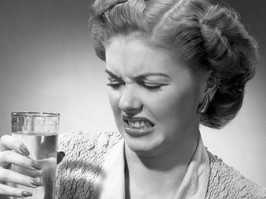advice: my daughter bites her nails
nail biting can ruin your nails, damage your teeth and spread bacteria. here's how to tame the habit.

biting your nails is a common habit that's hard to break. getty
dear asking for a friend,my 18-year-old daughter bites her nails all the time, often until the nail is below the skin. she says she can’t help it, especially when she is stressed or nervous. we have tried putting a bitter apple polish on them that tastes bad, but that hasn’t worked. i am also worried that she is exposing herself to germs and bacteria. any suggestions as to how i can help her to stop? signed, stubby nailsdear stubby nails,it’s not unusual for children and adolescents to use repetitive behaviours to help soothe themselves. according to experts, nail biting may serve as a distraction and help bring about feelings of emotional balance and calm.“it’s acceptable to suck the thumb as a child, but once we’ve retired it, we need a replacement behaviour that’s soothing,” explains joseph eliezer, a registered psychotherapist, clinical counsellor and author based in british columbia. “nail biting or picking, to the unconscious, is like removing a hard surface (exterior) so that difficult emotions (interior) can be released.”research shows that roughly 20 to 30 per cent of people bite their nails, including up to 45 per cent of teenagers. factors such as boredom, nerves or anxiety may trigger nail biting, but there is also evidence that suggests that children whose parents bite their nails may be more prone to developing the habit. it can also occur as a result of working on difficult tasks, according to some studies, and in rare cases, nail biting can be a side effect of medication.but whether it’s boredom or nerves, it’s a tough habit to break because of the way our brains are wired. consider that it takes just 66 days to form a habit, and that anything that may feel soothing or enjoyable causes the brain to release dopamine. this is a good thing except that when we feel pleasure or relief as a result of an action, we want to experience more of it. so you can see how nail biting can become an efficient, automatic and an addictive response to a specific trigger or stressor.
eliezer says that in order to stop a behaviour, it needs to be interrupted and replaced with something else that soothes. this is part of a three-step process that starts with becoming more aware of the habit and making a conscious effort to stop doing it. then substituting the behaviour with another action, such as getting a drink of water, taking a walk, taking deep breaths or watching tv.“literally, almost any substitute to the behaviour that you think will work, will work,” suggests eliezer. “the trick is to teach the mind, or the self, not to engage in a behaviour that a person would ultimately like to stop.”other strategies include regular manicures — perhaps your daughter may be less likely to bite her nails if they look nice. she could also try covering her nails with tape, or wearing gloves. might regular manicure might motivate your daughter to stop biting her nails. if her nail biting habit continues, or becomes worse or interferes with her daily functioning, a behavioural therapist can offer additional support.is there something about health that you (or a friend, wink, wink) have always wondered about, but are too embarrassed to ask? send a note to info@healthing.ca. we promise your ‘friend’s’ secret – and identity – is safe with us!
eliezer says that in order to stop a behaviour, it needs to be interrupted and replaced with something else that soothes. this is part of a three-step process that starts with becoming more aware of the habit and making a conscious effort to stop doing it. then substituting the behaviour with another action, such as getting a drink of water, taking a walk, taking deep breaths or watching tv.“literally, almost any substitute to the behaviour that you think will work, will work,” suggests eliezer. “the trick is to teach the mind, or the self, not to engage in a behaviour that a person would ultimately like to stop.”other strategies include regular manicures — perhaps your daughter may be less likely to bite her nails if they look nice. she could also try covering her nails with tape, or wearing gloves. might regular manicure might motivate your daughter to stop biting her nails. if her nail biting habit continues, or becomes worse or interferes with her daily functioning, a behavioural therapist can offer additional support.is there something about health that you (or a friend, wink, wink) have always wondered about, but are too embarrassed to ask? send a note to info@healthing.ca. we promise your ‘friend’s’ secret – and identity – is safe with us!
 3 minute read
3 minute read





